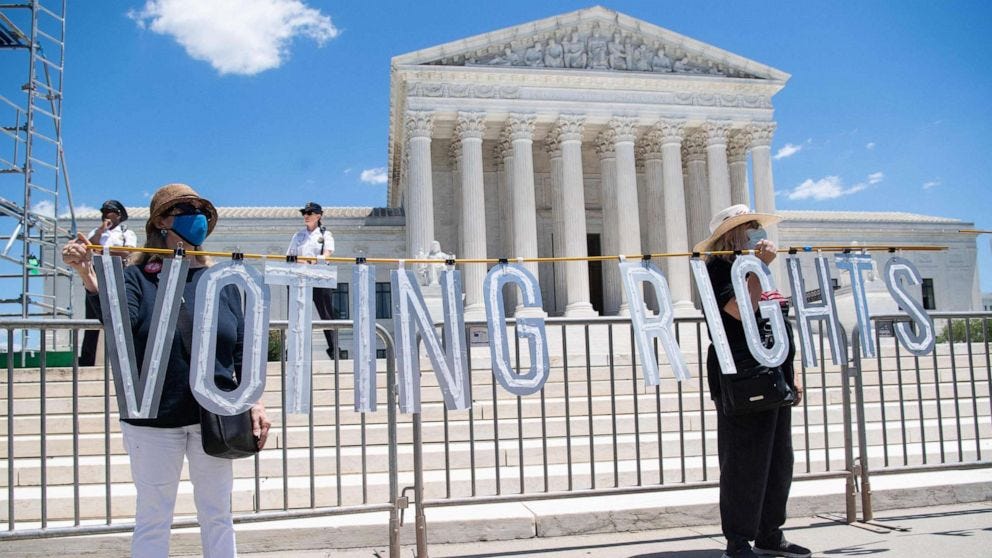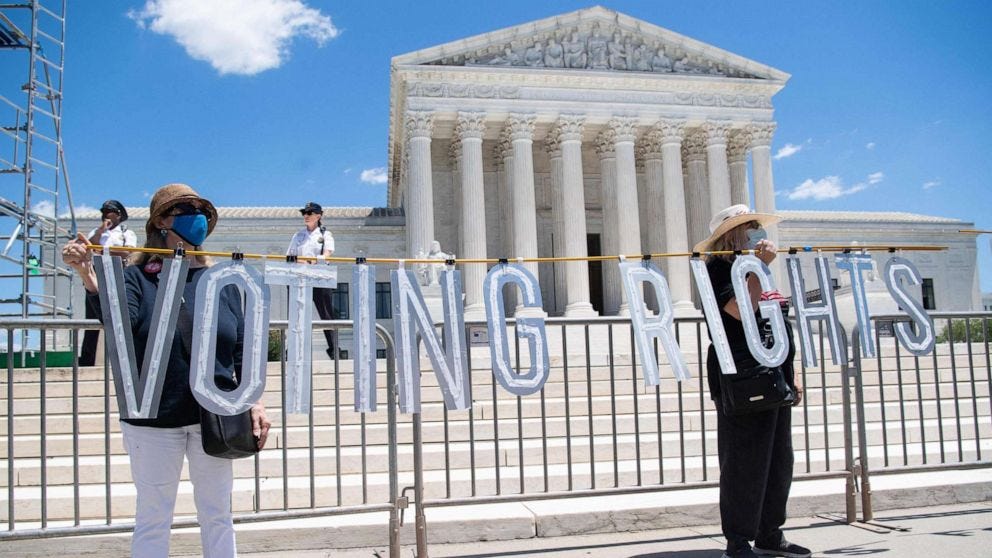Wake Up To Politics - July 2, 2021
Wake Up To Politics: Supreme Court upholds Arizona voting law
Good morning! It’s Friday, July 2, 2021. Election Day 2022 is 494 days away. Election Day 2024 is 1,222 days away.
Today is the 245th anniversary of the Continental Congress voting to declare America’s independence from Great Britain. Two days later, of course, the delegates would vote to approve the text of the Declaration of Independence, the day now celebrated as Independence Day.
In a letter to his wife, John Adams predicted that July 2, 1776, would be “the most memorable epocha in the history of America” and that it would be celebrated “with pomp and parade” as the “great anniversary festival.” At least he was only two days off.
Speaking of Independence Day, Wake Up To Politics will be taking next week off while both chambers of Congress leave town for their Fourth of July recess. I hope all of you enjoy your holiday weekend and I will see you back in your inboxes soon!
Before I go... I wanted to share this Twitter thread I wrote a few days ago that talks a little bit about what I think sets Wake Up To Politics apart, in case you’re interested in reading it or sharing with your friends.
Don’t forget to use your unique referral link — *|RH_REFLINK|* — when you share WUTP with friends, as it will give you access to cool rewards like the special “Gabe’s Picks” section and an upcoming Zoom Q&A with me and other members of the WUTP news team.
Every share helps, and I really do appreciate it. As always, if you ever have any questions or feedback, don’t hesitate to email me and say hi or let me know how I’m doing. It truly means so much to me to have you as part of the Wake Up To Politics community.
And now, to the news:
The Supreme Court handed down its final opinions of the term on Thursday. After some surprising end-of-term rulings and cross-ideological alliances, the justices rounded things off with a pair of highly anticipated opinions, both of which were divided 6-3 along the usual ideological lines.
In Brnovich v. Democratic National Committee, the six conservative justices overturned a lower court ruling to uphold a pair of Arizona voting policies: one criminalizing “ballot harvesting,” when anyone who isn’t an election official or a family member turns in someone else’s absentee ballot, and another requiring election officials to throw out ballots cast in the wrong precinct.
Justice Samuel Alito, writing for the majority, said in his opinion that Section 2 of the Voting Rights Act — which Democrats challenged the Arizona laws under — only requires voting be “equally open” to people of all races and cannot be used to challenge laws that create “mere inconvenience.” The ruling further weakened the landmark 1965 civil rights law, much of which the court previously invalidated in 2013, and created new obstacles for Democratic hopes to challenge other voting restrictions in Republican-controlled states.
Meanwhile, in Americans for Prosperity Foundation v. Bonta, Chief Justice John Roberts authored the majority opinion striking down a California law that required non-profit organizations to disclose the identities of their major donors, which he described as a violation of the First Amendment.
Attorney General Merrick Garland ordered a temporary pause on federal executions. “The Department of Justice must ensure that everyone in the federal criminal justice system is not only afforded the rights guaranteed by the Constitution and laws of the United States but is also treated fairly and humanly,” he wrote in a memorandum on Thursday, also noting the disproportionate impact of the death penalty on people of color and the “troubling number of exonerations” in capital cases.
House Speaker Nancy Pelosi named Rep. Liz Cheney (R-WY) to the House select committee investigating the January 6 attack. The appointment by Democratic leadership is another step away from the Republican Party by Cheney, who was ousted from House GOP leadership in May. “Our oath to the Constitution, our commitment to the rule of law, and the preservation of the peaceful transfer of politics must always be above partisan politics,” Cheney said in a statement accepting the post.
Cheney was one of two House Republicans to support the creation of the panel, along with Rep. Adam Kinzinger (R-IL). House Minority Leader Kevin McCarthy has yet to indicate whether he will make his own appointments to the committee; he has been allocated five of the 13 spots, although the House resolution gives Pelosi veto power over his picks.
The U.S. withdrawal from Afghanistan is almost complete. All American troops have been removed from Bagram Airfield, the largest U.S. military base in the country, Fox News reported. According to the Washington Post, the military is expected to complete its withdrawal from Afghanistan “within a matter of days,” although it is expected to remain involved there through September 11, the withdrawal deadline set by President Biden in April.
There are significant fears that the U.S. withdrawal will lead to the Taliban making gains in the region: according to the Wall Street Journal, the U.S. intelligence community has concluded that the Afghan government could collapse “as soon as six months” after American troops withdraw.
Prosecutors accused former President Donald Trump’s real estate company of orchestrating a 15-year “scheme to defraud” the government. The office of Manhattan District Attorney Cyrus Vance unsealed the indictment against Trump’s business on Thursday, charging the Trump Organization and its longtime chief financial officer Allen Weisselberg with fraudulently offering benefits to top executives that they failed to pay taxes on. “To put it bluntly, this was a sweeping and audacious illegal payments scheme,” Vance said.
Policy Roundup: Health
On Fridays, Wake Up To Politics contributor Ellen Burstein catches you up on the week’s top health headlines:
Nearly 100 people died in a record-setting heatwave in the Pacific Northwest. Temperatures hit nearly 115 degrees in some parts of Oregon, which had recorded just 72 heat-related deaths in the previous 20 years. At least 90 deaths in Washington and Oregon have been attributed to the heatwave, which also sent more than 1,1000 people to hospitals in the two states. Scientists say that global warming will continue to cause temperatures to rise. In the United States, extreme heat has caused more deaths than other extreme weather events in the past thirty years. According to the CDC, there were 505 heat-related deaths in 2019.
A new study suggests that CRISPR gene editing can be used to directly treat diseases. Researchers at Intellia Therapeutics and Regeneron used the gene editing therapy to treat six patients with transthyretin amyloidosis, a rare and fatal disease characterized by the excess buildup of amyloid proteins in the body. Those treated with the highest dose experienced nearly a 90 percent reduction in protein buildup, according to the study. Researchers in the past have used CRISPR technology to edit genes extracted from the body before placing them back in. This study demonstrates that CRISPR can be directly administered in the bloodstream, which could have significant implications for patients with other conditions.
A study found that Pfizer and Moderna’s Covid-19 vaccines are likely to produce long-lasting immunity to the virus. Scientists found that vaccinated individual’s germinal centers — structures in the body that train B cells to fight the coronavirus — remained active nearly four months after vaccination, indicating that the vaccines will provide long-term protection. Moderna and Pfizer both say their vaccines are highly effective against the newly-evolved, highly transmissible Delta variant, but vaccine boosters may be needed if the virus evolves to evade current protections. In addition, older adults and immunocompromised people may still need a booster shot of the vaccine.

More health headlines, via Ellen:
Wearing a high-grade, FFP3 mask can almost entirely protect healthcare workers from contracting coronavirus, according to a study.
Johnson and Johnson says its vaccine is protective against the Delta variant.
Former HHS Secretary Donna Shalala called for an investigation of the FDA’s approval of a controversial Biogen drug to treat Alzheimer’s disease.
The CDC says needle exchanges are required to treat an HIV outbreak in Charleston, West Virginia, which has banned the practice.
Daybook
What’s happening in Washington today. (All times Eastern)
Executive Branch
→ President Joe Biden will receive his daily intelligence briefing at 9:30 a.m. Later, at 10:15 a.m., he will deliver remarks on the June jobs report. At 11:40 a.m., he will host the Los Angeles Dodgers at the White House to honor their 2020 World Series championship.
At 12:30 p.m., Biden will have lunch with Vice President Kamala Harris. At 2:30 p.m., he will participate in a naturalization ceremony being held at the White House ahead of Independence Day. Finally, at 5 p.m., he will deliver remarks to the National Education Association’s annual meeting in Washington, D.C.
→ Vice President Kamala Harris will join Biden for the Los Angeles Dodgers event and for lunch. At 3:45 p.m., she will travel to Los Angeles, where she will spend the weekend.

→ First Lady Jill Biden will also deliver remarks at the NEA’s annual meeting.
→ Second Gentleman Doug Emhoff will travel to Utah. At 2:30 p.m., he will visit Bryce Canyon National Park to “highlight how national parks provided a safe way for people to connect with family and friends outdoors and stay active during the pandemic.”
→ White House Press Secretary Jen Psaki will hold her daily press briefing at 12:30 p.m.
Legislative Branch
→ The Senate is not in session.
→ The House will convene at 11:30 a.m. for a brief pro forma session.
Judicial Branch
→ The Supreme Court will release orders at 9:30 a.m. from its Thursday conference, the justices’ last meeting of the term.
Thanks for waking up to politics! If you enjoy reading this newsletter, I’d be so grateful if you’d consider donating to help support me and my work. If you want to show off your support for Wake Up To Politics, you can also buy some merchandise.
Also: don’t forget to tell your friends and family to sign up for the newsletter using your unique referral link. And if you have any questions or comments, feel free to email me at any time.






